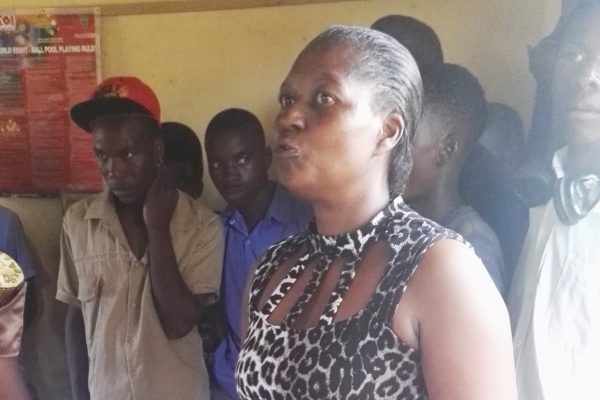
Astudy carried out by Ohio State University in 2010 revealed that when children belong to a youth club, they gain a stronger sense of who they are as a person. The study suggests that even small improvements in self-concept go a long way towards keeping children out of trouble.
By Moses Mugugunyeki
The study aptly rings true about the boon that has been realised by the Nyakuchena community in Mudzi district, Mashonaland East province, following the setting-up of a youth centre in the area, thanks to the Zimbabwe National Family Planning Council.
Nyakuchena Youth Centre has become a training centre for empowering young people with life skills, more so, the centre has become a second home to many youths from the community.
Because attendance is voluntary, some children come more frequently than others. They freely choose between recreational activities such as playing pool, academic assistance and life skills classes.
According to youth facilitator at the centre Joyce Chipfupi, youths engage in various activities ranging from indoor and outdoor games, group talks and peer-to-peer counselling, among others.
“We have facilities that include a library, youth-friendly clinic, indoor and outdoor games facilities. We also hold sports galas and cooking competitions to keep the youths occupied,” Chipfupi said.
“We also encourage youth to get tested of HIV and sexually transmitted infections [STIs]. We have 10 peer educators who facilitate the training programmes.” Chipfupi said the programmes at the centre promoted positive outcomes by providing opportunities, fostering positive relationships and giving the support that is needed to develop young people and prevent risky behaviours.
- Chamisa under fire over US$120K donation
- Mavhunga puts DeMbare into Chibuku quarterfinals
- Pension funds bet on Cabora Bassa oilfields
- Councils defy govt fire tender directive
Keep Reading
“We have seen significant improvement in social and emotional skills, attitudes and academic performance and a reduction in risky behaviour since the establishment of this youth centre,” she said.
“Being part of the youth centre has boosted youths’ social skills and has reduced youths’ vulnerability to negative influences, which in turn decrease their likelihood of using drugs and alcohol or failing in school,” she said.
Chipfupi, however, said some parents were denying their children, especially girls’ access to the youth centre.
“You will realise that culturally girls are overprotected by their parents than boys. Here in Nyakuchena, we have the same predicament where boys constitute a large chunk of youths who visit this place because their sisters will be home assisting with household chores,” she said.
Nineteen-year-old Hope Trust Gadaga said the youth centre was keeping him and his peers away from bad influences.
“The youth centre is keeping us busy, under supervision and interaction with other positive peers is driving us away from negative influences,” Gadaga said.
“I took advantage of the library facility here when I was about to write my A’ Level exams and thank God, I did very well.”
His sentiments were echoed by Irene Mukonachimwe (15), who is a peer educator in charge of gardening and poultry at the youth centre.
“The youth centre keeps us occupied, especially when we are not going to school. The garden project is helping us get some money to buy school stationery while at the same time we are getting life skills,” she said.
Youth centre chairperson Jekesai Musodza said Mudzi, like any other marginalised community, was saddled with harmful cultural practices.
“As a community we have these archaic practices which perpetuate the discrimination and infringement of girls’ fundamental civil liberties. This youth centre was established with the aim of transforming the community to be more sensitive to children, especially girls’ social rights and gender equality and equity issues,” she said. “The other reason is that addressing the sexual and reproductive health needs of young people is a tall order, hence establishing a youth centre was one way of reaching out to the young people.”
Nyakuchena Youth Centre was established six years ago and the centre has assisted thousands of youths from Nyakuchena and surrounding communities. The centre is open for youths aged between 10 and 24.
According to youth health advisor Blessing Gandanhamo, there has been a reduction of STIs among the youths due to the sexual and reproductive health programmes they offer at the youth centre.
“The community used to record high cases of STIs among the youths, but of late, we have seen a significant reduction. We have a comprehensive sexual and reproductive health programme, which I believe is paying dividends,” Gandanhamo said.
“We have also seen youths coming for HIV testing and counselling, which I believe is a better way of responding to the HIV and Aids menace. I am hopeful these youths when they grow up will take the positives they acquired here into the community.”
National Aids Council provincial manager for Mashonaland East Wilfred Dube told journalists during a tour of the province that the province had rolled out a cocktail of HIV intervention programmes.
“Our services are mainly targeted at truck drivers, commercial sex workers, gold panners and youths who are among key populations at high risk of HIV infection in this province. We have HIV testing and counselling services at moonlight testing, sports and musical galas as well as shopping centres, among others,” he said. Chipfupi said during sports galas the youth centre engages partners, including NAC and the Health ministry, to provide HIV testing and counselling services.











